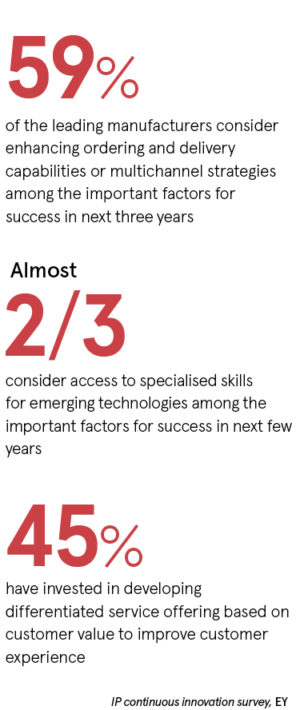New technology is transforming the way products are designed and manufactured, opening up revolutionary opportunities as well as creating new challenges for industrial businesses. The products’ full potential will only be realised, however, if companies can develop more innovative ways to serve customers.
“The issue that many manufacturing and industrial businesses are going to face is how to get their products, services and ideas to market. That is an area which the sector could focus on more,” argues Peter Matthews, partner at Ernst & Young LLP, who heads the UK advanced manufacturing and mobility business at EY, a professional services organisation.

The challenge is all the greater because it comes at a time of economic instability, with growth slowing, globalisation stalling and political tensions around issues such as Brexit and the US-China trade conflict. Against this backdrop, companies will be under more pressure than ever from investors to show they can grow their sales, which requires an increased focus on commercialisation.
Mr Matthews says: “Many companies’ core strengths are in designing and manufacturing groundbreaking products and having great ideas. That’s where they spend a lot of their budgets and a lot of their time; they are very aware of trying to improve the efficiency of manufacturing processes. The big question is, once you have new products and efficient manufacturing processes, how do you drive growth?”
Digital marketing has become essential for growth as the ways businesses engage with customers have changed. The most obvious example is digital. With so much information now available online, virtually all buyers research suppliers’ products and offerings before they even talk to the sales organisation. That means digital marketing becomes much more important.
“It’s an area where advanced manufacturing businesses have a bit more work to do compared with consumer-led businesses, which have been dealing with this for a while,” Mr Matthews says.
To improve their customers’ experience, manufacturing companies need to make fuller use of data analytics and effective customer relationship management systems to make sure they understand customers’ needs, whether these are other businesses or the end-consumers. In turn, they need to raise the level of skills within their sales organisation, so people can use these tools effectively and draw the right inferences about customers’ priorities.
Manufacturing companies can only compete on cost, technology and commercialisation. Commercialisation and the routes to market are key, not just using new technology to manufacture exactly what the customer wants and to reflect how they use products, but also to think about redesigning routes to market to reflect new capabilities, not simply traditional assets.
“We need a more agile process to reflect what the customer is actually asking for. Manufacturing to the customer’s specification is becoming evermore important in a world where digital manufacturing enables you to be more flexible than you might have been 30 years ago,” says Mr Matthews.
Customers will be looking for a seamless blend of online and offline contact. “They are going to be looking for consistency of experience across different salespeople, different products and different divisions, so they feel as if they are dealing with one business. There is an increased need for strong account management and senior client handlers within the sector,” he says.
In this new world, people recruited into manufacturing, as well as customers, will be interested in using products and services that carry a sense of purpose; products which make a genuine difference to people’s lives.
“The additional challenge for manufacturing will be about talent acquisition,” Mr Matthews says. “Many of the science, technology, engineering and mathematics skills required are in short supply, so companies need to have a very clear purpose that will motivate and inspire a new generation who want to use those skills to help produce goods which change the world for the better.”
For more information on NextWave Manufacturing please visit ey.com/mfg or contact Peter Matthews.
